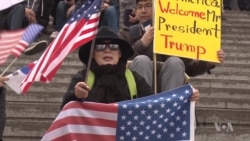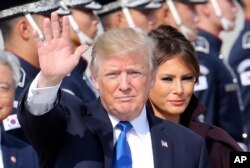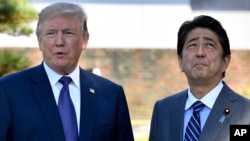U.S. President Donald Trump says North Korea's nuclear and ballistic missile weapons program poses a "worldwide threat that requires worldwide action," and criticized countries that support the regime of Kim Jong Un.
"It is unacceptable that nations would help arm and finance this increasingly dangerous regime. As we work together to resolve this problem using all available tools short of military action the United States stands prepared to defend itself and its allies using the full range of our unmatched military capabilities if need be," Trump said Tuesday at a joint news conference with his South Korean counterpart, Moon Jae-in, at Seoul's presidential Blue House residence.
The U.S. president said the two nations cannot allow Pyongyang "to threaten all that we have built" since the two sides fought side-by-side in the Korean War over six decades ago. He accused the North Korean leader of "threatening millions and millions of innocent lives so needlessly."
"I believe it makes sense for North Korea to do the right thing" by coming to the negotiating table, Trump said, adding Washington and Seoul are working together for a peaceful resolution to the situation with North Korea.
WATCH: South Koreans Welcome Trump to Seoul
Trump and his wife Melania arrived in Seoul earlier Tuesday, beginning their two-day visit with a trip to Camp Humphreys, a U.S. military base located about 100 kilometers from the demilitarized border separating communist North and democratic South.
During a meeting with military commanders, Trump told reporters the situation with Pyongyang "will all work out, it always works out, it has to work out."
Later in the day, President Moon told his U.S. counterpart during talks at the presidential Blue House he hoped his visit will serve as a "turning point in resolving the North Korean nuclear issue" and relieve the "anxiety" among South Koreans about the situation.
Grant Newsham, a senior research fellow at the Japan Forum for Strategic Studies, told VOA's Victor Beattie there is little daylight between the two countries on North Korea, despite Trump's bellicose rhetoric and Moon's insistence on diplomacy plus sanctions.
"I think where the real problem is that when the U.S. tries to get a trilateral Japan-Korea-America relationship going, particularly in the military sphere, there's really a limit to how far that will go, or [how far] President Moon will let it go," said Newsham.
During his first stop in Tokyo earlier this week, Trump and Japanese Prime Minister Shinzo Abe agreed that "all options are on the table" when it comes to dealing with North Korea.
Abe, at a news conference with Trump at the Akasaka Palace in Tokyo, said Monday there is “no point in dialogue for the sake of dialogue with North Korea” and the time has come to exert maximum pressure on Pyongyang.
Abe and Trump, following a second day of meetings, confirmed that North Korea has been the dominant topic of their discussions.
The U.S. president called Pyongyang’s pursuit of placing a nuclear warhead on an intercontinental ballistic missile “a threat to the civilized world and international peace and stability.”
Trump repeated that the era of strategic patience in dealing with Pyongyang is over.
“Some say my rhetoric is strong, but look what’s happened with weak rhetoric over the last 25 years,” the president said, criticizing the approaches of previous U.S. administrations. But he declined to answer a Japanese reporter’s question about whether he is prepared to go to war with North Korea.
The president was also asked about what fresh message he has for Kim Jong Un; the Reuters news agency reporter noting Trump’s response to a VOA question on Air Force One on the way to Japan in which he referred to the North Korean people as industrious and warm.
Trump also said North Korean leader Kim Jong Un, whom he has belittled as “Little Rocket Man,” should send back to Japan any surviving Japanese abducted by North Korean agents over decades.
“It would be a tremendous signal,” said Trump. The “start of something very special.”
Abe revealed during the joint news conference that on Tuesday he will announce his country will freeze assets of nearly three dozen North Korean groups and individuals.
The unilateral measures follow enhanced sanctions on North Korea placed by the U.S. Treasury Department and the United Nations.
Trump, in a pair of public pronouncements in Tokyo on Monday said he expects Japan will purchase “massive amounts” of American military equipment and some of it will enable Japan to shoot North Korean missiles “out of the sky.”
A nearly three-year war on the Korean peninsula in the early 1950s ended in a stalemate that pitted the United States, South Korea and the United Nations against North Korea, which was backed by forces from China and the Soviet Union.
No peace treaty was signed and the Korean peninsula has remained divided ever since.
North Korea makes frequent claims that the United States is seeking to reignite full-scale conflict.
State media in Pyongyang on Monday, referring to Trump, said that “no one can predict when the lunatic old man of the White House, lost to senses, will start a nuclear war” against North Korea.
North Korea says the situation strongly requires the country to bolster its nuclear deterrent and “the U.S. should not expect us to make any changes.”










